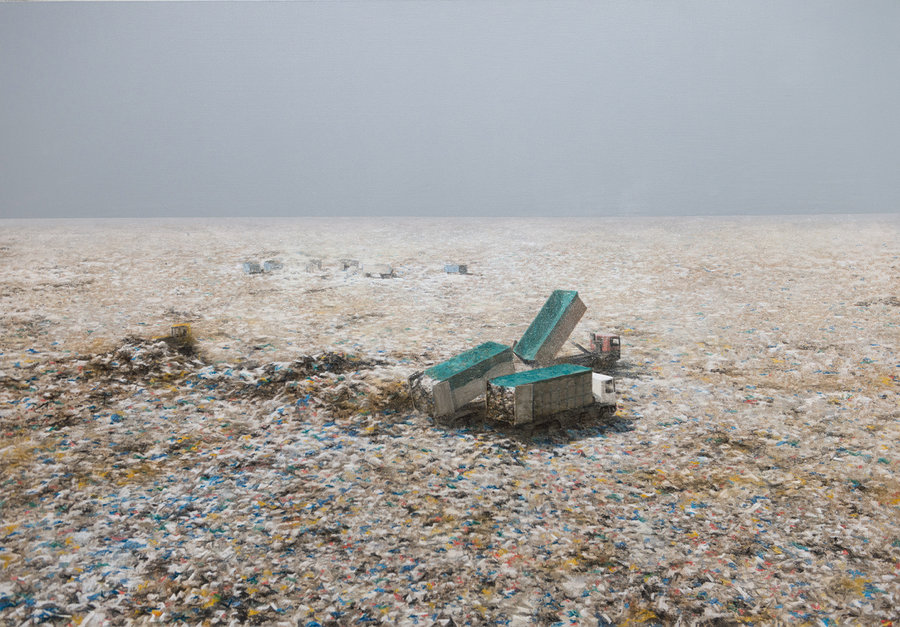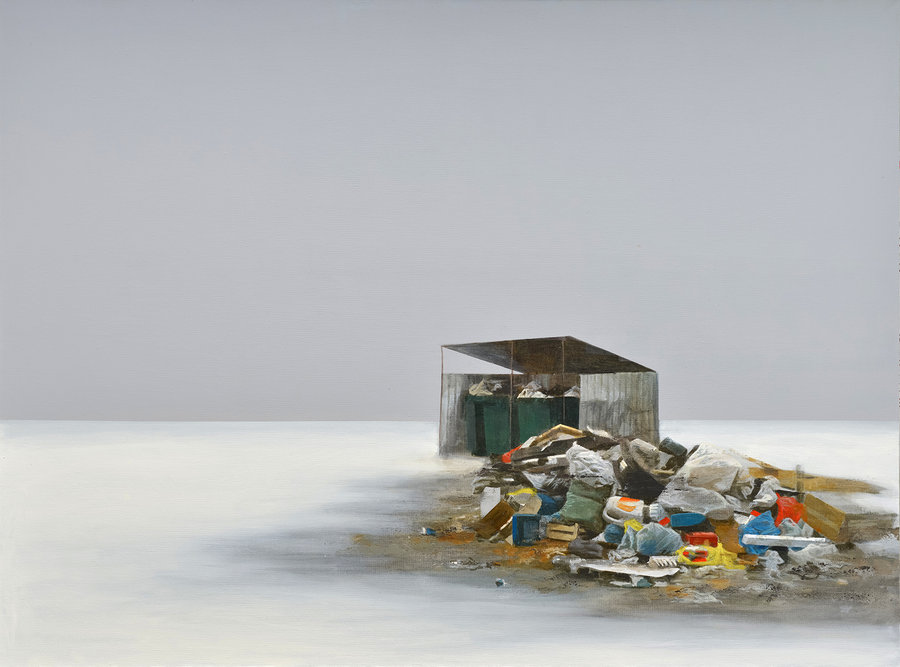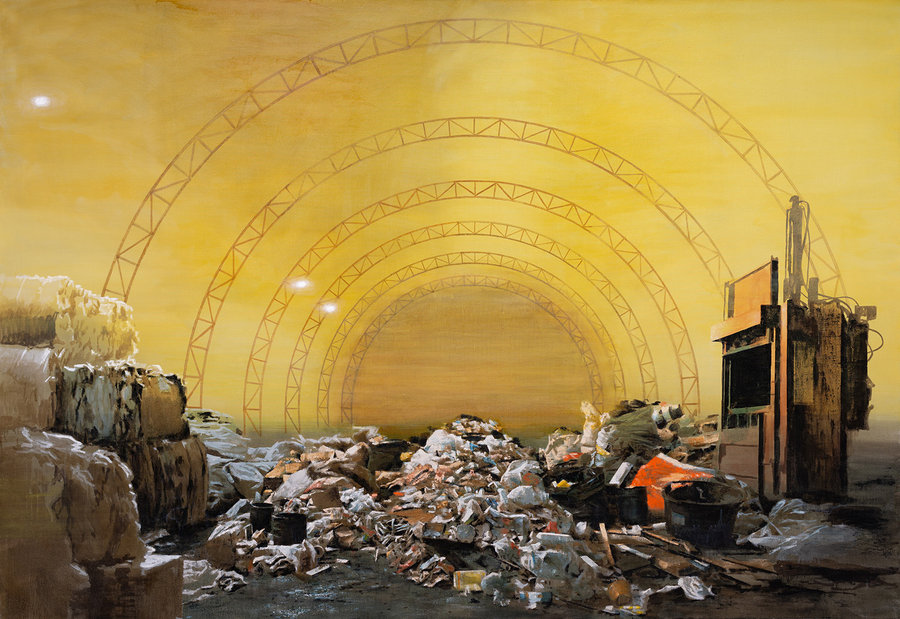Shitty Sea
When I went to kindergarden, we had a teacher who, when overwhelmed with cleaning, used to say: “We’ll all have to set sail on the shitty sea.” I had been to the sea by then and was trying to imagine how a “shitty sea” would look like. Many years later I moved to a place near the Moscow Automobile Ring Road. Not far from my new place was a huge dump—a plateau as high as a 17-story high-rise. One day I hiked up the dump and recalled the prophetic saying by the kindergarden teacher: stretching over the horizon was a landscape of plastic bags, packaging and other trash.
The recent outrage around new MSW landfills (municipal solid waste) made me pay attention to this problem once again. I did an experiment to find out where my household waste goes to and what happens to it next. I purchased a dozen of small GPS trackers and threw them in the trash in different districts of Moscow. Near my home, near my studio, near other places I visit. This basically means that I covered the entirety of Moscow. I plotted each tracker on a map to visualize the movement of waste. I went and saw its final destinations, including a waste sorting facility and MSW landfills. Two of the landfills were outside the Moscow Region.
I recorded what I could and made into a film Trash Travel. The paintings Landfill Timokhovo and Landfill Aleksndrov depict the landfills that received waste from near my home and studio.
Pavel Otdelnov. Landfill Aleksandrov. 2019. oil on canvas. 180x260
Pavel Otdelnov. Landfill Timokhovo. 2019. oil on canvas. 180x260
Pavel Otdelnov. Rubbish. 2020. oil on canvas. 150x200
Pavel Otdelnov. Waste Sorting. 2020. oil on canvas. 180x260. Private collection
Waste Sorter Diary
Having had my breakfast, I googled “waste sorting jobs” and immediately found a listing on HeadHunter. “Wages from RUB 1,900 to 3,000 per day” and four exclamation points. “Payouts weekly on Saturdays, no experience needed, accommodation provided.” I dialed the phone number.
— Sure, come to the site.
Next thing I know I am riding the subway. As if I were a protagonist in some strange movie. Farewell, Home Sweet Home by Iosseliani came to mind where the hero wakes up in a luxurious estate and sails to Paris on a boat to work as a window cleaner and dish washer.
Already on the go I realized that the sorting company was not EcoLine that I knew but something different.
Moscow has locations that are a perfect fit for the social media community The Beauty of Blight. This was one of such places. As the particularly specific odor was intensifying, I knew I had the right address.
I rang a bell in a tall opaque fence. An inconspicuous door opened, and I was in.
I was met by shift foreman Sasha who asked:
— Looks like you want to set up your own waste business.
— No, I just want to try to sort waste.
— You from Moscow? I mean, do you have somewhere to stay?
— Yes.
— You’ll not stay here for long and be gone after two or three days.
I was carefully avoiding huge rancid puddles, but my feet were slumping into the mud anyway.
— Do you have a pair of boots to change and some clothes?
— Don't think so, look around in the storage.
I put one someone’s ragged jacket. And immediately regretted not bringing any gloves.
A heap of grime-soaked gloves was piled on a huge furnace. I had to suppress disgust in order to put them on. And I could barely bend my fingers.
We entered a huge yellow hangar full of raw waste and gigantic bags with sorted recyclables. For the first several minutes, the stench felt intolerable. After a while I noticed a few people fumbling around near the largest heap. I introduced myself. The co-workers were surprised that, having a place to live, I still came to work there. Olga arrived from Saratov. Nikolay came from Chernigov—he said he was now making twice as much in Russia. Yuri, a mechanic and also from Ukraine, had worked there for eight years. I asked about their work there.
— Not bad really, just picking at it all day. No one watching over your shoulder. Honest pay—you get as much as you earn.
— We get paid per job, you get 700 rubles for a point-fiver (unloading a 1.5-ton transport container). A larger container pays 2,500.
I got a relatively small pile, a point-fiver.
— Pick PET first, these are almost any plastic bottles with a dot on the bottom. Dairy goes separately. Aluminum and tin cans separately. Separate all cardboard and paper.
A dedicated bucket for bottle caps. Get a bucket for glass, too, and a bigbag for plastic. If you find wood, put it over there.
The mountain of waste appeared indefinitely huge and, most importantly, homogenous. Just something amorphous and patchy. I began plucking glass and plastic bottles.
— If there’s liquid in the bottles, drain it into the bucket.
There were many fluids: mostly, sour milk and piss. I knew that truckers often used empty bottles to tap a kidney, but how did all those bottles get here? My gloves got soggy pretty soon and my finger movement was restored somewhat.
There were a lot of bottles in the pile, including vodka. Olga was upset:
— So much drinking! And this is a batch from an industrial site...
Indeed, almost all glass bottles were vodka and plastic bottles were soda (to flush it down, apparently), tin cans with cigarette butts and potato shavings. I found among the waste an arm patch with the logo of Gidrotrest. (Upon later googling this turned out to be a major construction company that does road junctions and other civil engineering.) Based on the contents of waste, on the number of vodka bottles and bare cigarette butts, this was waste from blue-collar builders. I suppose it had accumulated over a few months. Their living conditions seemed to be harsh, where you’d prefer a plastic bottle over the piercing cold of an outhouse.
Three hours in I realized that I barely noticed the smell. At around the same time my eyes had tuned to differentiate the different types of waste.
As I had picked all the glass, cardboard and paper, metal and plastic, the sorter Sergey told me that tins and other metal need to be separated from food-grade aluminum. The foreman then emerged to instruct me that all PE bags and film need to be picked as well. I had to go through the entire pile once over. The bags were sticky, some had a cracked egg, others contained rotten fatback... Almost all bags had nested in them other bags and sachets, which, in turn, held something, often unidentifiable. All this was just putrid biomass. I got an entire bigbag of plastic bags and other polyethylene.
The foreman then told me I had not went through the bottom layer meticulously enough. Armed with a shovel, I had to go for another round. I recovered the final tins and plastic bottles from a sticky, almost homogenous mass.
The torture seemed to have no end.
Astonishingly, the pile had shrunk three or four times, and I was rather surprised. The remainder was biodegradable (already degraded to a considerable degree) and different non-recyclables, like egg cartons and foamed cups from instant noodle.
I asked about the average percentage that gets recovered for processing.
— It depends. But always more than half. Sometimes it is almost all of it.
Reading up on waste recycling, I had never seen anything like 60–70%, and it usually said about 10–15%. What I was handling was the “worst” variety of unsorted household waste. The things that I saw at the more advanced and clean processing plant at EcoLine—individual conveyors for (un)sorted collection, different workers to pick specific waste types—turned out to be several times less effective than the slow-paced hand sorting I did at the hangar. But would there be many takers for such a job?
I was emptying the last of bags and tin cans with rotten meat paste as I heard the manager’s voice:
— Do you recognize why we do all this?
— Sure. To get as much recyclables as possible, this is money after all.
— Correct! Keep in mind that the transportation of refuse to the landfills is paid by the company. If we have less waste remaining, we have lower costs.
I thought that had the incoming waste been sorted at least into “non-recoverables” and “recyclables,” it would had made the job much easier and, obviously, cleaner.
Bending and lugging bigbags all day made my back ache. By the end of the day, I got accustomed to the stench, but I got a feeling that I had become one of its sources.
That day the site received household waste. Some days they bring in broken curbs and other construction debris. This is even harder.
I earned 700 rubles but never got them, in order to get paid you have to clock in for at least three days.
The working day is eight to eight. It’s all picking during the day, and in the evenings recyclables are compacted by special balers in the same hangar.
I asked that my earnings were split among other workers.
I took a taxi home, which cost me a day and a half of such work. My pants and shoes looked as if I had found them in one of the waste piles. I got lucky and the driver did not notice, otherwise, he’d refuse to take me.
First thing I did back home was to throw all my clothes into the washer and set it to EXTRA CLEANING, and then spent quite a while soaking in the shower. Following that, still, my hands felt sticky and there remained dirt under my nails. As I was falling asleep, I felt as if I still had the dirty gloves on, and the endless unsorted waste floated by past my gaze.
"The Trash Trip". 2019. film. 18'20"




